跨文化情景剧剧本
跨文化交际 情景case study
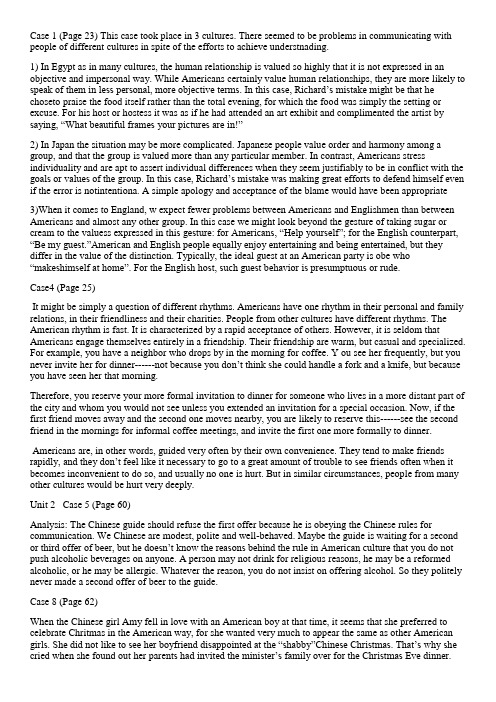
Case 1 (Page 23) This case took place in 3 cultures. There seemed to be problems in communicating with people of different cultures in spite of the efforts to achieve understnading.1) In Egypt as in many cultures, the human relationship is valued so highly that it is not expressed in an objective and impersonal way. While Americans certainly value human relationships, they are more likely to speak of them in less personal, more objective terms. In this case, Richard’s mistake might be that he choseto praise the food itself rather than the total evening, for which the food was simply the setting or excuse. For his host or hostess it was as if he had attended an art exhibit and complimented the artist by saying, “What beautiful frames your pictures are in!”2) In Japan the situation may be more complicated. Japanese people value order and harmony among a group, and that the group is valued more than any particular member. In contrast, Americans stress individuality and are apt to assert individual differences when they seem justifiably to be in conflict with the goals or values of the group. In this case, Richard’s mistake was making great efforts to defend himself even if the error is notintentiona. A simple apology and acceptance of the blame would have been appropriate 3)When it comes to England, w expect fewer problems between Americans and Englishmen than between Americans and almost any other group. In this case we might look beyond the gesture of taking sugar or cream to the valuess expressed in thi s gesture: for Americans, “Help yourself”; for the English counterpart, “Be my guest.”American and English people equally enjoy entertaining and being entertained, but they differ in the value of the distinction. Typically, the ideal guest at an American party is obe who “makeshimself at home”. For the English host, such guest behavior is presumptuous or rude.Case4 (Page 25)It might be simply a question of different rhythms. Americans have one rhythm in their personal and family relations, in their friendliness and their charities. People from other cultures have different rhythms. The American rhythm is fast. It is characterized by a rapid acceptance of others. However, it is seldom that Americans engage themselves entirely in a friendship. Their friendship are warm, but casual and specialized. For example, you have a neighbor who drops by in the morning for coffee. Y ou see her frequently, but you never invite her for dinner------not because you don’t think she could handle a fork and a knife, but becau se you have seen her that morning.Therefore, you reserve your more formal invitation to dinner for someone who lives in a more distant part of the city and whom you would not see unless you extended an invitation for a special occasion. Now, if the first friend moves away and the second one moves nearby, you are likely to reserve this------see the second friend in the mornings for informal coffee meetings, and invite the first one more formally to dinner.Americans are, in other words, guided very often by their own convenience. They tend to make friends rapidly, and they don’t feel like it necessary to go to a great amount of trouble to see friends often when it becomes inconvenient to do so, and usually no one is hurt. But in similar circumstances, people from many other cultures would be hurt very deeply.Unit 2 Case 5 (Page 60)Analysis: The Chinese guide should refuse the first offer because he is obeying the Chinese rules for communication. We Chinese are modest, polite and well-behaved. Maybe the guide is waiting for a second or third offer of beer, but he doesn’t know the reasons behind the rule in American culture that you do not push alcoholic beverages on anyone. A person may not drink for religious reasons, he may be a reformed alcoholic, or he may be allergic. Whatever the reason, you do not insist on offering alcohol. So they politely never made a second offer of beer to the guide.Case 8 (Page 62)When the Chinese girl Amy fell in love with an American boy at that time, it seems that she preferred to celebrate Chritmas in the American way, for she wanted very much to appear the same as other American girls. She did not like to see her boyfriend disappointed at the “shabby”Chinese Christmas. That’s why she cried when she found out her pare nts had invited the minister’s family over for the Christmas Eve dinner.She thought the menu for the Chritmas meal created by her mother a strange one because there were no roast turkey and sweet potatoes but only Chinese food. How could she notice then the food chosen by her mother were all her favorites?From this case, we can find a lot of differences between the Chinese and Western cultures in what is appropriate food for a banquet, what are good table manners, and how one should behave to be hospitable. However, one should never feel shame just because one ’ s culture is different from others ’ . As Amy’ s mother told her, you must be proud to be different, and your only shame is to have shame.Unit 3她们的小孩子在公园一起玩Judy and Carmen are not real friends. They don’ t want to get together, really. They once met each other a month ago. Americans sometimes make general invitation like “ Let ’ s get together sometimes.” Often this is just a way to be friendly. It is not always a real invitation. If they ’ d l ike to set a specific (exact) time, that means a real offer.Case 9 (Page 96)Traditional Japanese respect their elders and feel a deep sense of duty toward them. The elders in traditional Japanese families are typically overpowered. So the grandfather seemed to be an absolute authority for the young chairman. In Japanese culture challenging or disagreeing with elder’ s opinions would be deemed as being disrespectful. That is why the young chairman said nothing but just nodded and agreed with his grandfather. And it results in the Japanese company’s withdrawal from the negotiations concerning a relationship with Phil’ s company a week later.Case 10 (Page 97)In Japan, a company is very much like a big family, in which the manager will take care of the employees and the employees are expected to cevote themselves to the development of the company and, if it is necessary , to sacrifice their own interests for the interests of the company. But to the French, a company is just a loosely-knit social organization wherein individuals are supposed to take care of themselves and their families. And the family is the number one priority, which is unlike the Japanese model “not involving females and the right to decide by dominant male” . Case 11 (Page 97)In most cultures, an apology is needed when an offence or violation of social norms has taken place. Too many Westerners, Japanese apologize more frequently and an apology in Japanese does not necessarily mean that the person is acknowledging a fault. To many Japanese, Westerners may seem to be rude just because they do not apologize as often as the Japanese would do. In this case, the attitude of the Australian student’s parents is shocking the Japanese but will be acceptable in an English-speaking society, for the student is already an adult and can be responsible for her own deeds.。
文化差异英语二人情景剧

文化差异英语二人情景剧Michael: Billy! I think there is an inferno in the company kitchen.迈克尔:比利!我觉得公司的厨房着火了。
Billy: Really! Why do you think so?比利:真的吗!你为什么会这么想?Michael: There is a terrible smell coming from there.迈克尔:有一股难闻的气味从那儿飘出来。
Billy: Can you describe it for me?比利:能给我形容一下吗?Michael: Billy, it is a very strong smell that made my eyes water when I walked past.迈克尔:比利,那是一种很强烈的气味,从那路过的时候我的眼睛都出眼泪了。
Billy: You are such a dill Michael. Maybe someone isre-heating their lunch.比利:你真是个傻瓜迈克尔。
也许是有人在加热他们的午餐。
Michael: This cannot be someone’s lunch! No one could eat something that smelled that bad.迈克尔:不可能是某个人的午餐!没有人会吃味道那么糟糕的东西。
Billy: You know that we have people from many different countries working in the office and their cuisine is very different from ours.比利:你要知道在我们办公室里工作的人来自不同的国家,他们的饮食跟我们是完全不同的。
Michael: But they are in our country now! They should act like we do!迈克尔:可他们现在在我们的国家!他们做事的方式应该跟我们一样!Billy: You cannot say that! What you just said is very insulting and ignorant. You need a lesson in Cultural Diversity at work.比利:你不可以这么说!你刚才说的话很无礼也很无知。
跨文化情景剧剧本,DOC
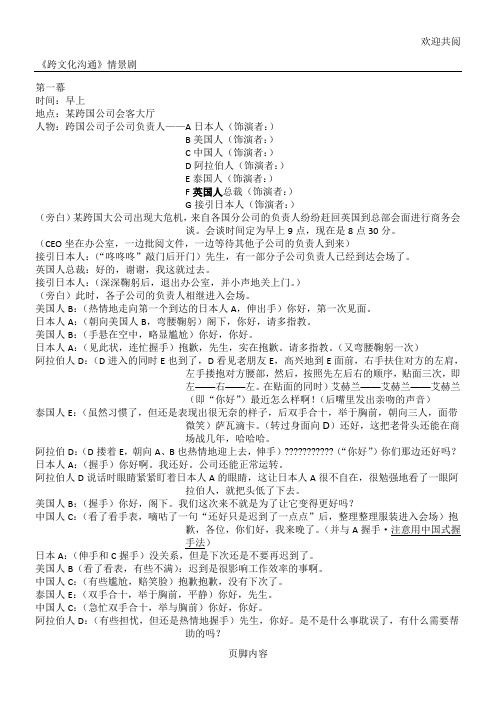
欢迎共阅《跨文化沟通》情景剧第一幕时间:早上地点:某跨国公司会客大厅人物:跨国公司子公司负责人——A日本人(饰演者:)B美国人(饰演者:)C中国人(饰演者:)D阿拉伯人(饰演者:)E泰国人(饰演者:)(旁白)(CEO美国人B日本人A美国人B日本人A阿拉伯人泰国人E阿拉伯D日本人A阿拉伯人美国人B:(握手)你好,阁下。
我们这次来不就是为了让它变得更好吗?中国人C:(看了看手表,嘀咕了一句“还好只是迟到了一点点”后,整理整理服装进入会场)抱歉,各位,你们好,我来晚了。
(并与A握手·注意用中国式握手法)日本A:(伸手和C握手)没关系,但是下次还是不要再迟到了。
美国人B(看了看表,有些不满):迟到是很影响工作效率的事啊。
中国人C:(有些尴尬,赔笑脸)抱歉抱歉,没有下次了。
泰国人E:(双手合十,举于胸前,平静)你好,先生。
中国人C:(急忙双手合十,举与胸前)你好,你好。
阿拉伯人D:(有些担忧,但还是热情地握手)先生,你好。
是不是什么事耽误了,有什么需要帮助的吗?中国C:(消除了一些尴尬,微笑)没事,路上塞车耽误了。
谢谢,十分感谢。
阿拉伯人D:哈哈哈,有什么事可以找我,我可以帮忙的尽量帮你啊。
(之后又高兴地和A、B、C、E谈起生活和工作上的事)接引人G:(推开门,等总裁F进入会客厅后,跟在F身后进了会场,并关上门)总裁F:(走进会客厅,看到众人)各位,你好。
欢迎来到总部。
(脱帽,与众人握手,众人以各自礼仪回敬。
)接引人G:(右手放左胸前,左手放背后,略弯腰。
后用托盘拿出5杯咖啡)先生们,请用咖啡。
座位安排:英国人F阿拉伯人日本人A美国人B中国人C泰国人E英国总裁美国人B中国人C日本人A美国人B日本人A泰国人E总裁F泰国人E阿拉伯人美国人B总裁F:下午2点,我们再继续讨论一些相关的细节。
第二幕时间:散会之后地点:某跨国公司会客大厅外人物:跨国公司子公司负责人——A日本人(饰演者:)B美国人(饰演者:)C中国人(饰演者:)E泰国人(饰演者:)日本人A与其秘书的对话:(秘书很恭敬地跟在日本总裁身后,且始终微低着头)“那个阿拉伯经理真的让我感觉很不舒服,他总是直直地看着我的眼睛,实在太没有礼貌,太侵犯我的隐私了。
美国经典情景喜剧跨文化传播的文本解析——《老友记》剧作特征的
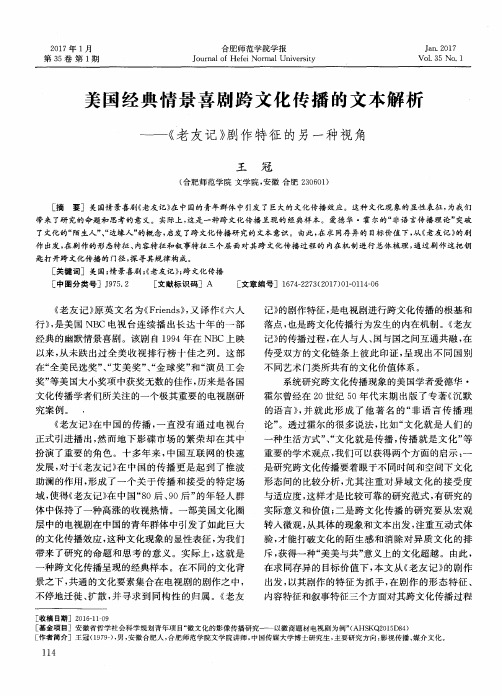
作 出发 , 在剧 作的形 态特征 、 内容特征 和叙事特征三 个层 面对其 跨文化 传播过 程 的 内在机 制进 行 总体梳理 , 通过剧 作这把 钥
匙 打 开 跨 文化 传 播 的 门径 , 探 寻其 规 律 构 成 。
[ 关键 词]美 国; 情景喜剧 ; 《 老友 记》 ; 跨 文化传播 [ 中图分 类号]J 9 7 5 . 2 [ 文献标 识码]A [ 文章编号] 1 6 7 4 — 2 2 7 3 ( 2 0 1 7 ) 0 1 — 0 1 1 4 — 0 6
《 老友记 》 原英 文 名 为 《 F r i e n d s ) ) , 又译作《 六 人 行》 , 是 美 国 NB C 电视 台 连续 播 出长 达 十 年 的一 部 经 典 的 幽默情 景 喜剧 。该 剧 自 1 9 9 4年在 NB C上 映 以来 , 从 未跌 出过 全美 收视 排 行 榜 十 佳 之 列 。这 部
的文化传播效应, 这种文化现象的显性表征 , 为我们
带 来 了研究 的命 题 和 思 考 的 意 义 。实 际 上 , 这 就 是
一
转人微观 , 从具体 的现象和文本 出发 , 注重互动式体 验, 才 能打破 文化 的 陌生 感 和 消 除对 异 质 文 化 的排
斥, 获得 一 种“ 美 美 与共 ” 意义 上 的文 化超 越 。由此 , 在 求 同存 异 的 目标 价值 下 , 本 文从 《 老友记》 的剧 作
2 0 1 7 年 1 月 第 3 5 卷 第 1 期
合肥师范学 院学报
J o u r n a l o f He f e i No r ma l Un i v e r s i t y
J a n . 2 0 1 7
跨文化情景剧剧本
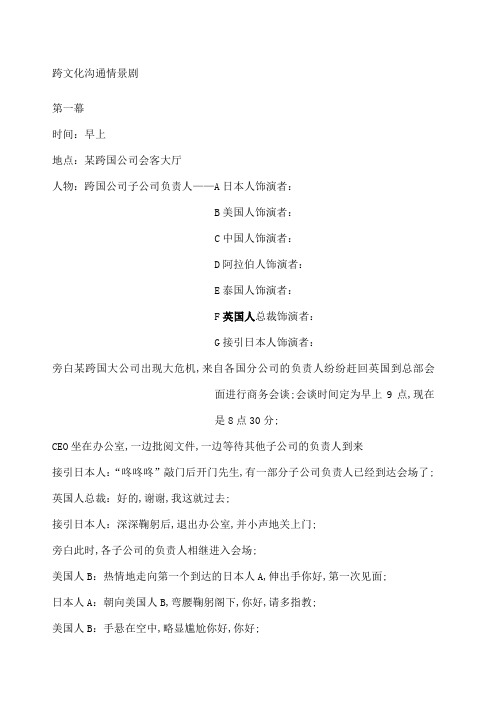
跨文化沟通情景剧第一幕时间:早上地点:某跨国公司会客大厅人物:跨国公司子公司负责人——A日本人饰演者:B美国人饰演者:C中国人饰演者:D阿拉伯人饰演者:E泰国人饰演者:F英国人总裁饰演者:G接引日本人饰演者:旁白某跨国大公司出现大危机,来自各国分公司的负责人纷纷赶回英国到总部会面进行商务会谈;会谈时间定为早上9点,现在是8点30分;CEO坐在办公室,一边批阅文件,一边等待其他子公司的负责人到来接引日本人:“咚咚咚”敲门后开门先生,有一部分子公司负责人已经到达会场了; 英国人总裁:好的,谢谢,我这就过去;接引日本人:深深鞠躬后,退出办公室,并小声地关上门;旁白此时,各子公司的负责人相继进入会场;美国人B:热情地走向第一个到达的日本人A,伸出手你好,第一次见面;日本人A:朝向美国人B,弯腰鞠躬阁下,你好,请多指教;美国人B:手悬在空中,略显尴尬你好,你好;日本人A:见此状,连忙握手抱歉,先生,实在抱歉;请多指教;又弯腰鞠躬一次阿拉伯人D:D进入的同时E也到了,D看见老朋友E,高兴地到E面前,右手扶住对方的左肩,左手搂抱对方腰部,然后,按照先左后右的顺序,贴面三次,即左——右——左;在贴面的同时艾赫兰——艾赫兰——艾赫兰即“你好”最近怎么样啊后嘴里发出亲吻的声音泰国人E:虽然习惯了,但还是表现出很无奈的样子,后双手合十,举于胸前,朝向三人,面带微笑萨瓦滴卡;转过身面向D还好,这把老骨头还能在商场战几年,哈哈哈;阿拉伯D:D搂着E,朝向A、B也热情地迎上去,伸手“你好”你们那边还好吗日本人A:握手你好啊;我还好;公司还能正常运转;阿拉伯人D说话时眼睛紧紧盯着日本人A的眼睛,这让日本人A很不自在,很勉强地看了一眼阿拉伯人,就把头低了下去;美国人B:握手你好,阁下;我们这次来不就是为了让它变得更好吗中国人C:看了看手表,嘀咕了一句“还好只是迟到了一点点”后,整理整理服装进入会场抱歉,各位,你们好,我来晚了;并与A握手·注意用中国式握手法日本A:伸手和C握手没关系,但是下次还是不要再迟到了;美国人B看了看表,有些不满:迟到是很影响工作效率的事啊;中国人C:有些尴尬,赔笑脸抱歉抱歉,没有下次了;泰国人E:双手合十,举于胸前,平静你好,先生;中国人C:急忙双手合十,举与胸前你好,你好;阿拉伯人D :有些担忧,但还是热情地握手先生,你好;是不是什么事耽误了,有什么需要帮助的吗中国C :消除了一些尴尬,微笑没事,路上塞车耽误了;谢谢,十分感谢;阿拉伯人D :哈哈哈,有什么事可以找我,我可以帮忙的尽量帮你啊;之后又高兴地和A 、B 、C 、E 谈起生活和工作上的事接引人G :推开门,等总裁F 进入会客厅后,跟在F 身后进了会场,并关上门总裁F :走进会客厅,看到众人各位,你好;欢迎来到总部;脱帽,与众人握手,众人以各自礼仪回敬;接引人G :右手放左胸前,左手放背后,略弯腰;后用托盘拿出5杯咖啡先生们,请用咖啡;座位安排:英国人F,那就是找出能够在,今天我想要看到一个解决方案;阿拉伯人D ,政治的纷争着实影响了我司的石油购进,我实在是难辞其咎啊;日本人A :不不不,我们是站在统一战线上的;石油市场瘫痪之时我司也没有及时对阿拉伯公司进行资金支援,我们也有责任;美国人B :很不耐烦地站了起来问题已经出现了,还花时间讨论谁该负责任干什么我们还是把时间花在谈论该如何挽救,该如何弥补的问题上吧;中国人C :不知总裁有什么好的看法不论上级有什么指示,我中方一定会努力配合;泰国人E:是的,是的,是的;英国总裁F:按照目前的形势,董事会提议放弃原有的石油供应商,在中东地区寻找新的合作伙伴;美国人B:这个想法好我支持更换石油供应商;更换新的供应商,必然会给我们的企业增加一些新的元素,给我们的企业带来更多的活力;中国人C:可是之前,和现在的供应商签下长期供应合同,可是花了我们好大的力气呢;就这样放弃我们好不容易才和对方建立起来的关系,可能不太好吧;而且,这次是因为政治因素才导致对方石油供应量不足,从长期看,我们和他们的合作还是有利的;日本人A:是的,我司分析了相关数据,也认为从长期看,和他们订立的长期供应合同对我司是非常有利的;美国人B:可是最近3个月的利益分析数据摆在那里,我们和他们的合作并没有给总公司带来什么实际的利益;长期利益短期都没有办法满足我们的需要,他们要如何满足我们长期的需求日本人A:听了有点不开心,可是他没有表现出来,还是对美国人微微一笑;泰国人E:嗯嗯,说得对说得对总裁F:泰国公司也支持美国公司的看法泰国人E:是的,是的;阿拉伯人D:我司收集有中东各主要石油供应商的相关数据,我现在就命专员整理发送到总部来;美国人B:好的;到时也给我发一份,或者我会派秘书到总部负责人这边取资料;总裁F:好的,收到数据后,我会下发给各位;大家今天乘坐飞机英国来也累了,先去休息一下吧,下午2点,我们再继续讨论一些相关的细节;第二幕时间:散会之后地点:某跨国公司会客大厅外人物:跨国公司子公司负责人——A日本人饰演者:B美国人饰演者:C中国人饰演者:E泰国人饰演者:日本人A与其秘书的对话:秘书很恭敬地跟在日本总裁身后,且始终微低着头“那个阿拉伯经理真的让我感觉很不舒服,他总是直直地看着我的眼睛,实在太没有礼貌,太侵犯我的隐私了;还有那个美国人,他在会议上,一直抢着回答,抢着表现自己,真是个爱出风头的家伙;而且,他一点等级观念也没有,总部总裁还没发话,他就要求阿拉伯公司发数据给他,真是的;”美国人B与其秘书的对话:“你现在先联系一下我们公司的会计分析员,把近3个月来我们公司的市场分析报告发到我的邮箱来;再派一个行政专员联络一下总部这边的负责人,把总部相关盈亏数据以及中东地区主要石油供应商的资料发送过来;我半个小时后要和我们公司的副总商讨一下;”中国人C与其秘书的对话:秘书接过中国总裁的大衣,并递过去一瓶水“老外开会真是奇怪,没有介绍嘉宾,没有讲什么开会致辞的,直入主题,一点形式也没有,我真挺不习惯的;还是先找个地方好好吃一顿饭吧;你帮我查查看,附近有没有什么比较有名的餐馆;”泰国人E与其秘书的对话:悄悄递过一支录音笔和一叠会议报告“快拿去给译员翻译翻译,我其实并没有听懂多少;哎,我当年学的英语早就忘得差不多了,而且他们今天说了那么多专业名词,我听都听得好辛苦,哪里还能给什么好方案呀快拿去给译员翻译翻译吧;”。
英语情景剧剧本范文初中传统文化

英语情景剧剧本范文初中传统文化The sun had just begun to set over the ancient village nestled in the rolling hills when the sound of laughter and chatter filled the air. It was the day of the annual Mid-Autumn Festival, and the entire community had gathered to celebrate this cherished tradition.Among the excited crowd were a group of middle school students, their eyes shining with anticipation. They were members of the school's drama club, and tonight they would be performing a special play to honor the rich cultural heritage of their hometown.The play's director, a passionate young teacher named Ms. Wang, had spent weeks carefully crafting the script, drawing inspiration from the legends and customs that had been passed down through generations. She wanted to create a piece that would not only entertain the audience but also instill a deeper appreciation for the traditions that had shaped their community.As the performers took their places on the makeshift stage, the villagers settled in, eager to witness the unfolding of the story. Theplay began with a young girl named Mei-Ling, who was struggling to understand the significance of the Mid-Autumn Festival. Her grandmother, a wise and gentle woman, decided to share the history and symbolism behind this beloved celebration.Mei-Ling listened intently as her grandmother spoke of the ancient tale of Chang'e, the beautiful moon goddess who was forced to live in solitude on the moon after consuming an immortality elixir. The grandmother explained how the moon had become a symbol of reunion and family, as the Mid-Autumn Festival was a time for loved ones to gather and enjoy the harvest moon together.As the story unfolded, the audience was transported to the mythical realm of the moon, where they witnessed the heartbreaking separation of Chang'e and her beloved husband, Hou Yi. The young actors skillfully portrayed the emotions of longing and sorrow, captivating the audience with their heartfelt performances.But the play did not end on a somber note. Instead, it celebrated the resilience and ingenuity of the Chinese people, who had found ways to honor Chang'e and keep her memory alive through the traditions of the Mid-Autumn Festival.The students showcased the vibrant customs of the holiday, from the making of delicate mooncakes to the lighting of colorful lanterns.They even incorporated traditional Chinese music and dance, infusing the performance with a rich cultural tapestry.As the play reached its climax, the audience erupted in applause, their faces alight with joy and pride. The young actors beamed with accomplishment, knowing that they had not only entertained but also educated their community about the enduring value of their cultural heritage.In the aftermath of the performance, the villagers gathered to share a feast of mooncakes and tea, their laughter and conversation mingling with the soft glow of the harvest moon. It was a moment of unity and celebration, a testament to the power of storytelling to bridge the past and the present, and to inspire a deeper appreciation for the traditions that define a community.For the students of the drama club, this experience had been transformative. They had not only honed their acting skills but had also gained a newfound respect for the rich tapestry of their cultural legacy. They knew that their performance had not only entertained but had also played a role in preserving and passing on the traditions that had shaped their community for generations.As the night drew to a close and the villagers began to disperse, the students lingered, their hearts filled with a sense of accomplishmentand purpose. They knew that their work was not done, that there were countless other stories waiting to be told, countless other traditions waiting to be celebrated. And they were ready to take on the challenge, to continue to be the guardians of their cultural heritage, and to inspire others to do the same.。
中国传统与文化的话剧剧本
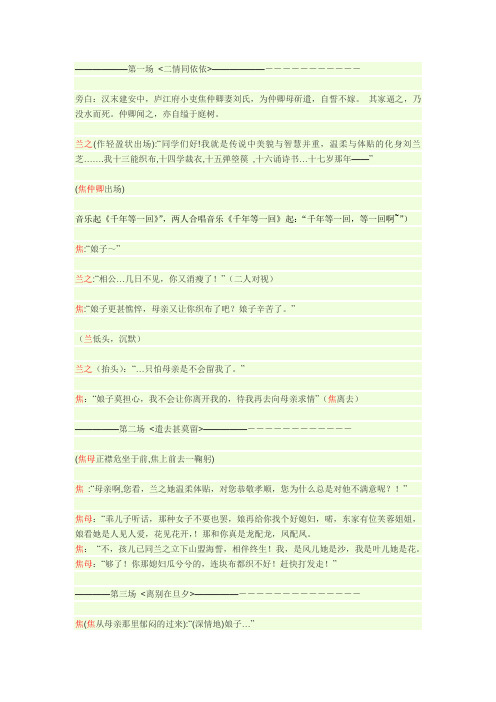
——————第一场<二情同依依>——————-----------旁白:汉末建安中,庐江府小吏焦仲卿妻刘氏,为仲卿母斫遣,自誓不嫁。
其家逼之,乃没水而死。
仲卿闻之,亦自缢于庭树。
兰之(作轻盈状出场):“同学们好!我就是传说中美貌与智慧并重,温柔与体贴的化身刘兰芝…….我十三能织布,十四学裁衣,十五弹箜篌,十六诵诗书…十七岁那年——”(焦仲卿出场)音乐起《千年等一回》”,两人合唱音乐《千年等一回》起:“千年等一回,等一回啊~”)焦:“娘子~”兰之:“相公…几日不见,你又消瘦了!”(二人对视)焦:“娘子更甚憔悴,母亲又让你织布了吧?娘子辛苦了。
”(兰低头,沉默)兰之(抬头):“…只怕母亲是不会留我了。
”焦:“娘子莫担心,我不会让你离开我的,待我再去向母亲求情”(焦离去)—————第二场<遣去甚莫留>—————------------(焦母正襟危坐于前,焦上前去一鞠躬)焦:“母亲啊,您看,兰之她温柔体贴,对您恭敬孝顺,您为什么总是对他不满意呢?!”焦母:“乖儿子听话,那种女子不要也罢,娘再给你找个好媳妇,喏,东家有位芙蓉姐姐,娘看她是人见人爱,花见花开,!那和你真是龙配龙,凤配凤。
焦:“不,孩儿已同兰之立下山盟海誓,相伴终生!我,是风儿她是沙,我是叶儿她是花。
焦母:“够了!你那媳妇瓜兮兮的,连块布都织不好!赶快打发走!”————第三场<离别在旦夕>—————--------------焦(焦从母亲那里郁闷的过来):“(深情地)娘子…”兰之:“相公,无须多言,奴家明白了。
焦(斩钉截铁):“兰之,你先放心回家,等我把母亲说服了就来接你.”兰之:“相公,我等你(焦送兰之走,两人携手走一段,作别)兰之:“君当作磐石,妾当作蒲苇,蒲苇纫如丝,磐石无转移…”.(两人悲伤的分别离去)————第四场<阿母大悲摧>—————---------------刘母:“兰之,怎么回来了?”兰之:“母亲,我……”刘母(生气地):“一定是被赶回来了!那婆娘果然卑鄙无耻,狼心狗肺。
中西跨文化交际课程情景案例分析
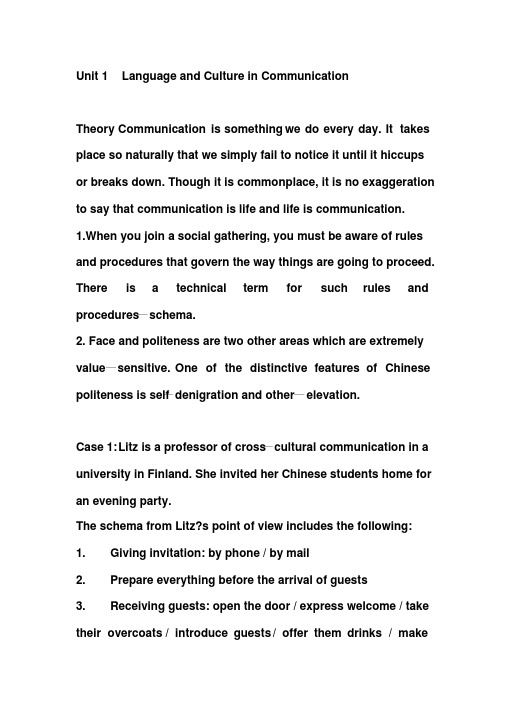
Unit 1 Language and Culture in CommunicationTheory Communication is something we do every day. It takes place so naturally that we simply fail to notice it until it hiccups or breaks down. Though it is commonplace, it is no exaggeration to say that communication is life and life is communication.1.When you join a social gathering, you must be aware of rules and procedures that govern the way things are going to proceed. There is a technical term for such rules and procedures—schema.2. Face and politeness are two other areas which are extremely value—sensitive. One of the distinctive features of Chinese politeness is self—denigration and other—elevation.Case 1: Litz is a professor of cross—cultural communication in a university in Finland. She invited her Chinese students home for an evening party.The schema from Litz?s point of view includes the following:1. Giving invitation: by phone / by mail2. Prepare everything before the arrival of guests3. Receiving guests: open the door / express welcome / take their overcoats / introduce guests / offer them drinks / makethem comfortable4. Serving food: set the table / soup first / main course / desert5. Post dinner activities: chat / play music / offer more drinks6. Seeing guests off: thank them for coming / good night Litz?s evening party was not very successful, b ecause s he was upset by one of her guests. Here was the initial conversation between Litz and Lin:Litz: (opens the door) Oh, Lin, how nice you could come!Lin: It?s not difficult to find your house.Litz: Come on in.Lin: (comes in)Litz: Can I take your coat?Lin: No, thanks.Litz: Ok, this way please.Lin: (take off her coat and hangs it)Analysis: Litz was hurt because Lin did not let her hang her coat. Litz?s offering to hang Lin?s coat is one of Litz?s ways (it?s on Litz?s schema). On Lin?s side, she thought that Litz was her supervisor and that it was inappropriate to let her supervisor hang her coat. Here we have an instance of one action attachedwith different cultural values.Case 2:Finding an Interested BuyerGeorage Hall was in Beijing attending a trade fair and lookingfor an opportunity to do business i n China. He had been very successful in his business dealings in the US and prided himselfHis first day was going on his ability “to get things moving.” well .He looked around at the displays of sporting equipment to get some idea of whom he might approach. He was sure that his products, tennis rackets with an unusual new design, would arouse some interests. On the second day he approached the company which he felt would be most responsive to his products. He introduced himself to the general, a Mr. Li. Since he had read that Chinese find getting down to business immediately too abrupt and rude, he began a casual conversation, eventually leading up to the topic of his products and suggesting how Mr. Li?s company might benefit from using them. George then suggested that he could arrange to get together with Mr. Li and provide more specifics and documentation on his products.That would be Mr. Li responded in fairly good English,” interesting.”Knowing that he had only a few days left in Beijing, GeorgeWhen can we meet?” a skedwanted to nail down a time,” George.“Ah. This week is very busy,” replied Mr. Li.How about 10 o?clock?“It sure is,” said George,” Meet you here.”“Tomorrow at 10 o?clock?” a sked Mr. Li thoughtfully.“Right,” said George, “I?ll see you then?”“Hmm, yes; why don?t you come by tomorrow,” wasthe reply.“OK,” responded George,” It was nice meeting you.”The next day at 10 o?clock h e approached Mr. Li?s company?sexhibit only to find that Mr. Li had some important business andwas not able to meet with George. He called back later in the dayand was told that Mr. Li was not available.Analysis: 英美人士做事情讲究守时。
- 1、下载文档前请自行甄别文档内容的完整性,平台不提供额外的编辑、内容补充、找答案等附加服务。
- 2、"仅部分预览"的文档,不可在线预览部分如存在完整性等问题,可反馈申请退款(可完整预览的文档不适用该条件!)。
- 3、如文档侵犯您的权益,请联系客服反馈,我们会尽快为您处理(人工客服工作时间:9:00-18:30)。
《跨文化沟通》情景剧
第一幕
时间:早上
地点:某跨国公司会客大厅
人物:跨国公司子公司负责人——A日本人(饰演者:)
B美国人(饰演者:)
C中国人(饰演者:)
D阿拉伯人(饰演者:)
E泰国人(饰演者:)
F英国人总裁(饰演者:)
G接引日本人(饰演者:)
—
(旁白)某跨国大公司出现大危机,来自各国分公司的负责人纷纷赶回英国到总
部会面进行商务会谈。
会谈时间定为早上9点,
现在是8点30分。
(CEO坐在办公室,一边批阅文件,一边等待其他子公司的负责人到来)
接引日本人:(“咚咚咚”敲门后开门)先生,有一部分子公司负责人已经到达会
场了。
英国人总裁:好的,谢谢,我这就过去。
接引日本人:(深深鞠躬后,退出办公室,并小声地关上门。
)
(旁白)此时,各子公司的负责人相继进入会场。
美国人B:(热情地走向第一个到达的日本人A,伸出手)你好,第一次见面。
日本人A:(朝向美国人B,弯腰鞠躬)阁下,你好,请多指教。
美国人B:(手悬在空中,略显尴尬)你好,你好。
日本人A:(见此状,连忙握手)抱歉,先生,实在抱歉。
请多指教。
(又弯腰鞠躬
一次)
阿拉伯人D:(D进入的同时E也到了,D看见老朋友E,高兴地到E面前,右手扶
住对方的左肩,左手搂抱对方腰部,然后,按
照先左后右的顺序,贴面三次,即左——右——
左。
在贴面的同时)艾赫兰——艾赫兰——艾
赫兰(即“你好”)最近怎么样啊!(后嘴里发
出亲吻的声音)
】
泰国人E:(虽然习惯了,但还是表现出很无奈的样子,后双手合十,举于胸前,
朝向三人,面带微笑)萨瓦滴卡。
(转过身面向
D)还好,这把老骨头还能在商场战几年,哈哈
哈。
阿拉伯D:(D搂着E,朝向A、B也热情地迎上去,伸手)(“你好”)你们那边还
好吗
日本人A:(握手)你好啊。
我还好。
公司还能正常运转。
阿拉伯人D说话时眼睛紧紧盯着日本人A的眼睛,这让日本人A很不自在,很勉
强地看了一眼阿拉伯人,就把头低了下去。
美国人B:(握手)你好,阁下。
我们这次来不就是为了让它变得更好吗
中国人C:(看了看手表,嘀咕了一句“还好只是迟到了一点点”后,整理整理服
装进入会场)抱歉,各位,你们好,我来晚了。
(并与A握手·注意用中国式握手法)
日本A:(伸手和C握手)没关系,但是下次还是不要再迟到了。
美国人B(看了看表,有些不满):迟到是很影响工作效率的事啊。
中国人C:(有些尴尬,赔笑脸)抱歉抱歉,没有下次了。
泰国人E:(双手合十,举于胸前,平静)你好,先生。
中国人C:(急忙双手合十,举与胸前)你好,你好。
~
阿拉伯人D:(有些担忧,但还是热情地握手)先生,你好。
是不是什么事耽误了,
有什么需要帮助的吗
中国C:(消除了一些尴尬,微笑)没事,路上塞车耽误了。
谢谢,十分感谢。
阿拉伯人D:哈哈哈,有什么事可以找我,我可以帮忙的尽量帮你啊。
(之后又高
兴地和A、B、C、E谈起生活和工作上的事)接引人G:(推开门,等总裁F进入会客厅后,跟在F身后进了会场,并关上门)总裁F:(走进会客厅,看到众人)各位,你好。
欢迎来到总部。
(脱帽,与众人握
手,众人以各自礼仪回敬。
)
接引人G:(右手放左胸前,左手放背后,略弯腰。
后用托盘拿出5杯咖啡)先生们,请用咖啡。
座位安排:英国人F:
那就是找出能够
解决方案。
阿拉伯人
D:
政治的纷争着实影
在是难辞其咎啊。
日本人A:不不不,我们是站在统一战线上的。
石油市场瘫痪之时我司也没有及时对阿拉伯公司进行资金支援,我们也有责任。
美国人B:(很不耐烦地站了起来)问题已经出现了,还花时间讨论谁该负责任干什么我们还是把时间花在谈论该如何挽救,该如何弥补的问题上吧。
中国人C:不知总裁有什么好的看法不论上级有什么指示,我中方一定会努力配合。
泰国人E:是的,是的,是的。
英国总裁F:按照目前的形势,董事会提议放弃原有的石油供应商,在中东地区寻找新的合作伙伴。
美国人B:这个想法好!我支持更换石油供应商。
更换新的供应商,必然会给我们的企业增加一些新的元素,给我们的企业带来更多的活力。
中国人C:可是之前,和现在的供应商签下长期供应合同,可是花了我们好大的力气呢。
就这样放弃我们好不容易才和对方建立起来的关系,可能不太好吧。
而且,这次是因为政治因素才导致对方石油供应量不足,从长期看,我们和他们的合作还是有利的。
!
日本人A:是的,我司分析了相关数据,也认为从长期看,和他们订立的长期供应合同对我司是非常有利的。
美国人B:可是最近3个月的利益分析数据摆在那里,我们和他们的合作并没有给总公司带来什么实际的利益。
长期利益短期都没有办法满足我们的需要,他们要如何满足我们长期的需求
日本人A:听了有点不开心,可是他没有表现出来,还是对美国人微微一笑。
泰国人E:嗯嗯,说得对!说得对!
总裁F:泰国公司也支持美国公司的看法
泰国人E:是的,是的。
阿拉伯人D:我司收集有中东各主要石油供应商的相关数据,我现在就命专员整理发送到总部来。
美国人B:好的。
到时也给我发一份,或者我会派秘书到总部负责人这边取资料。
总裁F:好的,收到数据后,我会下发给各位。
大家今天乘坐飞机英国来也累了,先去休息一下吧,下午2点,我们再继续讨论一些相关的细节。
第二幕
时间:散会之后
(
地点:某跨国公司会客大厅外
人物:跨国公司子公司负责人——A日本人(饰演者:)
B美国人(饰演者:)
C中国人(饰演者:)
E泰国人(饰演者:)
日本人A与其秘书的对话:(秘书很恭敬地跟在日本总裁身后,且始终微低着头)“那个阿拉伯经理真的让我感觉很不舒服,他总是直直地看着我的眼睛,实在太没有礼貌,太侵犯我的隐私了。
还有那个美国人,他在会议上,一直抢着回答,抢着表现自己,真是个爱出风头的家伙。
而且,他一点等级观念也没有,总部总裁还没发话,他就要求阿拉伯公司发数据给他,真是的。
”
美国人B与其秘书的对话:
“你现在先联系一下我们公司的会计分析员,把近3个月来我们公司的市场分析报告发到我的邮箱来;再派一个行政专员联络一下总部这边的负责人,把总部相
关盈亏数据以及中东地区主要石油供应商的资料发送过来。
我半个小时后要和我们公司的副总商讨一下。
”
中国人C与其秘书的对话:(秘书接过中国总裁的大衣,并递过去一瓶水)
“老外开会真是奇怪,没有介绍嘉宾,没有讲什么开会致辞的,直入主题,一点形式也没有,我真挺不习惯的。
还是先找个地方好好吃一顿饭吧。
你帮我查查看,附近有没有什么比较有名的餐馆。
”
泰国人E与其秘书的对话:(悄悄递过一支录音笔和一叠会议报告)
“快拿去给译员翻译翻译,我其实并没有听懂多少。
哎,我当年学的英语早就忘得差不多了,而且他们今天说了那么多专业名词,我听都听得好辛苦,哪里还能给什么好方案呀快拿去给译员翻译翻译吧。
”。
